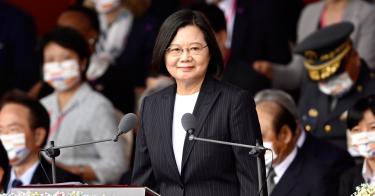The United States and Taiwan have long been strong partners that are committed to free markets, the rule of law, and democracy. Cooperation continues to grow, pragmatically, step by step.
A liberalizing, bilateral trade and investment agreement is the logical next step for upgrading mutual trust and expanding economic interaction between the two long-time partners. In the meantime, the recently signed Framework to Strengthen Infrastructure Finance and Market Building Cooperation is a welcome step forward in notching up U.S.-Taiwan strategic economic cooperation.
The new framework will help the U.S. and Taiwan work together to catalyze the development of quality infrastructure in emerging markets, particularly in the Indo-Pacific region and Latin America, “by unlocking barriers to private-sector investment in infrastructure projects.”
Such cooperation has considerable potential to promote best practices in developing countries and strengthen the efficiency of their economic engagement with potential trade and investment partners.
In the rapidly evolving world of development assistance, with its greater emphasis on the vital role of the private sector in achieving durable economic growth, enhancing U.S.-Taiwan international infrastructure development cooperation presents a unique opportunity to coordinate the two countries’ ongoing outreach strategies. These include America’s Indo-Pacific Strategy and Taiwan’s New Southbound Policy.
Highlighting the vibrant bilateral relationship between Washington and Taipei, David Stilwell, assistant secretary of the State Department’s Bureau of East Asian and Pacific Affairs, underscored during his recent remarks at The Heritage Foundation:
The U.S. and Taiwan are establishing a new bilateral economic dialogue. These talks will explore the full spectrum of our economic relationship—semiconductors, health care, energy, and beyond—with technology at the core …
Our relationship with Taiwan is not a subset of our bilateral relationship with the [People’s Republic of China]. Our friendship and cooperation with Taiwan stands on its own, fed from the wellsprings of shared values, cultural affinity, and commercial and economic ties.
For many years, The Heritage Foundation has also called for increased economic cooperation and broader dialogue to address areas of greater private-sector cooperation between the U.S. and Taiwan.
Such a unique practical partnership would reinforce other vital diplomatic links between the two allies, particularly given the fact that Taiwan has proven to be a reliable and strong ally for America in advancing freedom, opportunity, and prosperity in the region and around the globe.
More than ever, Washington needs to pursue and capitalize on every opportunity to promote free-market principles with like-minded and willing partners. The U.S. cannot reasonably go it alone if it wants to significantly address other countries’ non-market activities.
The U.S.-Taiwan economic relationship is one worth investing in to promote U.S. interests in the region.
This piece originally appeared in The Daily Signal




